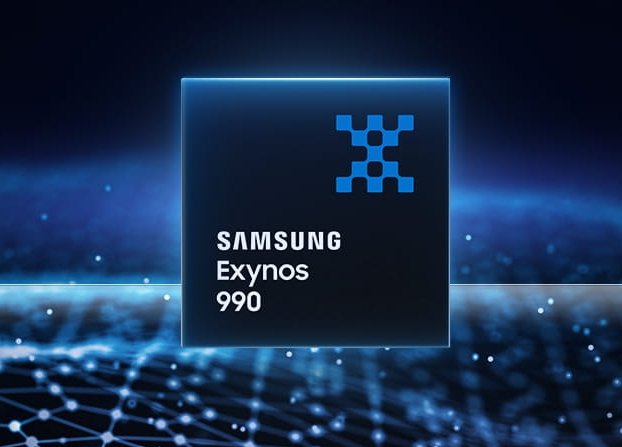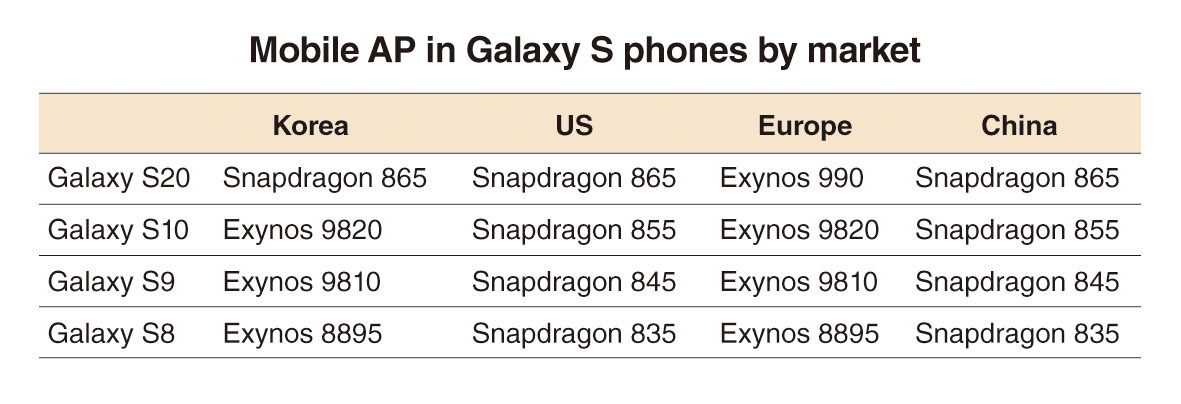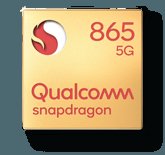[Chew on IT] Samsung keeps multivendor strategy for Exynos despite users’ aversion
No. of Galaxy models powered by Exynos chipsets may increase, as Qualcomm may delay new Snapdragon’s launch amid COVID-19 pandemic
By Song Su-hyunPublished : May 3, 2020 - 17:06

If a Samsung Galaxy user gets a smartphone powered by Samsung’s Exynos chipset, is the person getting the short end of the stick?
Depending on where they buy their Samsung phones, two users might end up owning Galaxy devices with identical exteriors, but different brains -- that is, different mobile application processors.
The chances are 50-50: Users get either Samsung’s Exynos or Qualcomm’s Snapdragon chipset.
In the case of the Galaxy 20 series, Samsung equipped phones bound for Europe with its in-house Exynos 990 chips, while adopting Snapdragon 865 for the other markets, including the US and Korea.
Korean Galaxy users were delighted to see Snapdragon-run Galaxy S20 phones on Samsung’s home turf, welcoming its decision to dump the Exynos chipsets.
Meanwhile, consumers in Europe have voiced disappointment for years -- ever since the Galaxy S8 series came out -- as they learned their Samsung phones would continue to run on Exynos, not Snapdragon.
In March, a Samsung phone user with the online username “Daniel H” started a petition to Samsung on Change.org, a global petition platform, urging the company to stop selling flagship phones with Exynos.
“Phones with Exynos SoC chips are shown to perform slower, have less battery life, use inferior camera sensors and processing, overheat and throttle faster, amongst other issues,” Daniel wrote in the petition.
As of Monday, more than 43,000 people around the world had signed the petition.
Many tech reviewers have compared the two mobile chipsets in terms of battery life, refresh rate, download speed, camera sensor and other factors.
Battery life is one of the most important factors used to evaluate a chipset’s overall performance.
According to a recent test by YouTuber PhonBuff, the Snapdragon 865 in the Galaxy S20+ offered a battery life that turned out to be about an hour longer than the Exynos 990 variant, when the same tasks -- making a phone call, texting, gaming and web browsing -- were done simultaneously.
Spec details also reveal that the Snapdragon outperforms the Exynos.

The peak download speed of the Qualcomm chipset is 7.5 gigabits per second, while that of the Samsung chip is 7.35.
The refresh rate, the number of times your monitor updates with new images each second, is 144 Hertz for Snapdragon and 120 for Exynos.
The Snapdragon 865 also supports up to 200 megapixels for a single camera, while the Exynos 990 supports 108 megapixels.
European consumers want to know why Samsung continues to use Exynos in flagship phones sold in Europe, and have asked the company to disclose the reason.
“At the very least, we would appreciate if Samsung were transparent about their inconsistencies. Alternatively, for Samsung to ensure we weren’t paying the exact same price or even higher than our US friends,” the petition said.

Some say Samsung stands to profit more by using the in-house chipset in global markets other than the US.
That’s because to offer phones on the largest mobile carriers -- such as Verizon and Sprint, which use the CDMA (Code-Division Multiple Access) standard -- Samsung needs to use the Snapdragon chipset for smartphones released in the US market. Qualcomm has an effective monopoly on the CDMA standard.
In markets that use the GSM (Global System for Mobile Communications) standard, Samsung can make more money by using its own Exynos instead of paying Qualcomm.
Samsung declines to explain why the company sells Exynos-powered phones in Europe, but highlights its multivendor strategy for sourcing parts.
“For upcoming models, it isn’t yet known whether the company would adopt Snapdragon for the European market,” said a Samsung official. “The company will stick to the current multivendor strategy.”
Some industry sources say Samsung will be increasing the proportion of Exynos chipsets in its upcoming phones, including the Galaxy Note 20, despite the negative feedback.
The sources speculate that Samsung’s system-on-chip business unit is working on an upgraded version of the Exynos 990, supposedly called the Exynos 992.
Also, there are rumors that Qualcomm might delay the launch of an upgraded version of Snapdragon, slated for the second half of the year, due to the impact of COVID-19.
In that case, Samsung’s plans to expand its use of the Exynos chipset would become more viable, industry insiders say.
By Song Su-hyun (song@heraldcorp.com)








![[From the Scene] Monks, Buddhists hail return of remains of Buddhas](http://res.heraldm.com/phpwas/restmb_idxmake.php?idx=644&simg=/content/image/2024/04/19/20240419050617_0.jpg&u=20240419175937)






![[From the Scene] Monks, Buddhists hail return of remains of Buddhas](http://res.heraldm.com/phpwas/restmb_idxmake.php?idx=652&simg=/content/image/2024/04/19/20240419050617_0.jpg&u=20240419175937)

![[KH Explains] Hyundai's full hybrid edge to pay off amid slow transition to pure EVs](http://res.heraldm.com/phpwas/restmb_idxmake.php?idx=652&simg=/content/image/2024/04/18/20240418050645_0.jpg&u=20240419100350)

![[Today’s K-pop] Illit drops debut single remix](http://res.heraldm.com/phpwas/restmb_idxmake.php?idx=642&simg=/content/image/2024/04/19/20240419050612_0.jpg&u=)